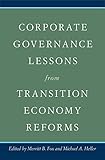Corporate Governance Lessons from Transition Economy Reforms / ed. by Michael A. Heller, Merritt B. Fox.
Material type: TextPublisher: Princeton, NJ : Princeton University Press, [2021]Copyright date: ©2006Description: 1 online resource (432 p.) : 8 line illus. 45 tablesContent type:
TextPublisher: Princeton, NJ : Princeton University Press, [2021]Copyright date: ©2006Description: 1 online resource (432 p.) : 8 line illus. 45 tablesContent type: - 9780691229294
- Corporate governance -- Law and legislation -- Case studies
- LAW / Government / General
- Adenaur government
- Amagasaki boseki
- Amoskeag Manufacturing
- Baltic Shipping Company
- Baltika Brewing
- Bank Menatep
- Boren trade association
- British Trans World Group
- Cherepovets, Russia
- Chernogoneft
- Civil Code, Russia
- Cooter, Robert
- Creditanstalt
- Dalmoreprodukt
- Erdenet
- Estonia
- Fuji boseki
- Gazprom
- Hirano boseki
- Jugo Bank
- Kanegafuchi boseki
- Kikuchi, Kyozo
- Kondpetroleum
- Konzern law
- Mitsubishi conglomerate
- Motoinvest
- Nisshin boseki
- Noyabrskneftegaz
- Oneksimbank
- Osaka Stock Exchange
- Osaka boseki
- Primakov, Yevgeni
- Roland, Gerard
- Samaraneftegaz
- Segezhabumprom
- Severstal
- Thatcher government
- Toyo boseki
- Ulaanbaatar, Mongolia
- Vanderbilt, Commodore
- Yasuda Bank
- automobile factory, Russia
- capacity inefficiency pathology
- cash auctions
- cash flow misinvestment pathology
- class action suits
- hostage functions
- incentive effects hypothesis
- phased privatization
- ruble collapse
- shock therapy theory
- spontaneous privatization
- 338.6 22
- HD2741
- online - DeGruyter
| Item type | Current library | Call number | URL | Status | Notes | Barcode | |
|---|---|---|---|---|---|---|---|
 eBook
eBook
|
Biblioteca "Angelicum" Pont. Univ. S.Tommaso d'Aquino Nuvola online | online - DeGruyter (Browse shelf(Opens below)) | Online access | Not for loan (Accesso limitato) | Accesso per gli utenti autorizzati / Access for authorized users | (dgr)9780691229294 |
Frontmatter -- Contents -- Introduction -- Part I: Framework -- CHAPTER ONE. What Is Good Corporate Governance? -- PART II. The Elements of Good Corporate Governance: Law -- CHAPTER TWO. Patterns of Legal Change: Shareholder and Creditor Rights in Transition Economies -- CHAPTER THREE. The Common Law and Economic Growth: Hayek Might Be Right -- PART III. The Elements of Good Corporate Governance: Owners and Managers -- CHAPTER FOUR. Russian Privatization and Corporate Governance: What Went Wrong? -- CHAPTER FIVE. Why Ownership Matters: Entrepreneurship and the Restructuring of Enterprises in Central Europe -- PART IV. The Elements of Good Corporate Governance: Stock Markets -- CHAPTER SIX/ Corporate Governance in Transitional Economies: Lessons from the Prewar Japanese Cotton Textile Industry -- CHAPTER SEVEN. Privatization and Corporate Governance: The Lessons from Securities Market Failure -- CHAPTER EIGHT. The Information Content of Stock Markets: Why Do Emerging Markets Have Synchronous Stock Price Movements? -- PART V. What Does Transition Contribute to Theory? -- CHAPTER NINE. Conclusion: The Unexplored Role of Initial Conditions -- List of Contributors -- Index
restricted access online access with authorization star
http://purl.org/coar/access_right/c_16ec
Corporate Governance Lessons from Transition Economy Reforms explores a timely topic at the intersection of economics, law, and policy reform. To date, most sophisticated theoretical work on corporate governance has focused on advanced market economies. In post-socialist countries, corporate finance and transition economics scholars have often done little more than convey the received theory to transition policymakers. This volume focuses, for the first time, on the reverse concern: what, if anything, do the reform experiences of transition countries teach about corporate governance theory more generally? To investigate this question, Merritt Fox and Michael Heller have assembled a stellar group of corporate governance theorists. The answers are startling. The principal essays approach the problem from three complementary perspectives that form the organizing themes of the book. The first part refines core corporate theory terms. The second presents important empirical work that explores the channels through which "good corporate governance" may link to the real economy. The final part links corporate governance theory to practical reforms. After fifteen years of experience, practice can now inform theory. Together, these essays present a comprehensive new view on a provocative theme. Written in an accessible style, they will be of interest to a broad range of scholars, commentators, and policymakers.
Mode of access: Internet via World Wide Web.
In English.
Description based on online resource; title from PDF title page (publisher's Web site, viewed 27. Okt 2021)


